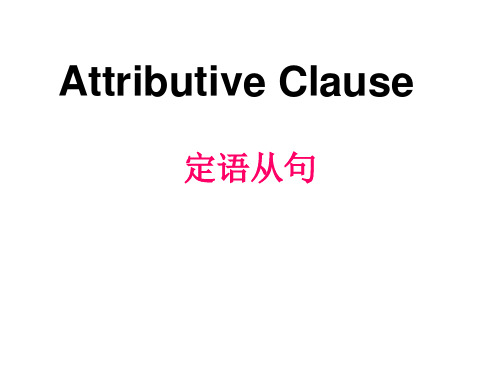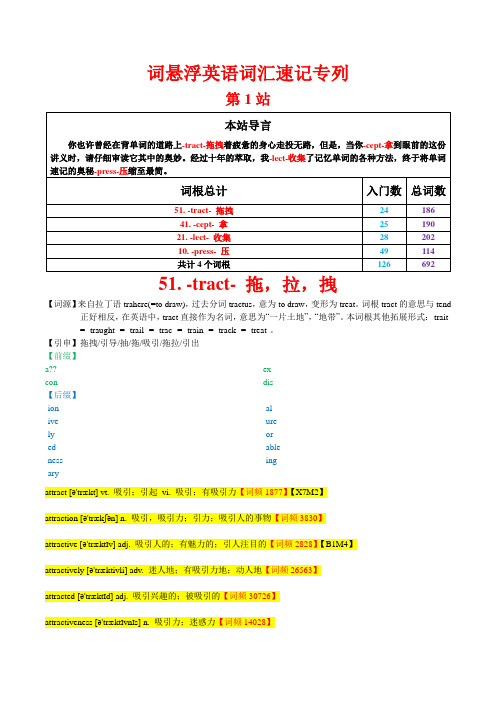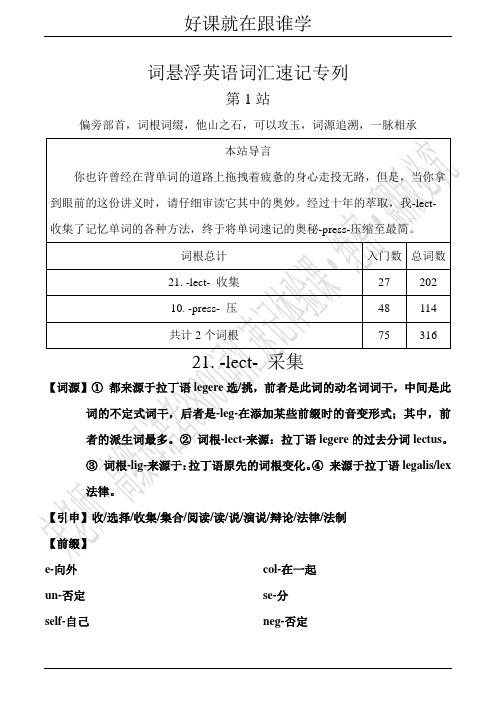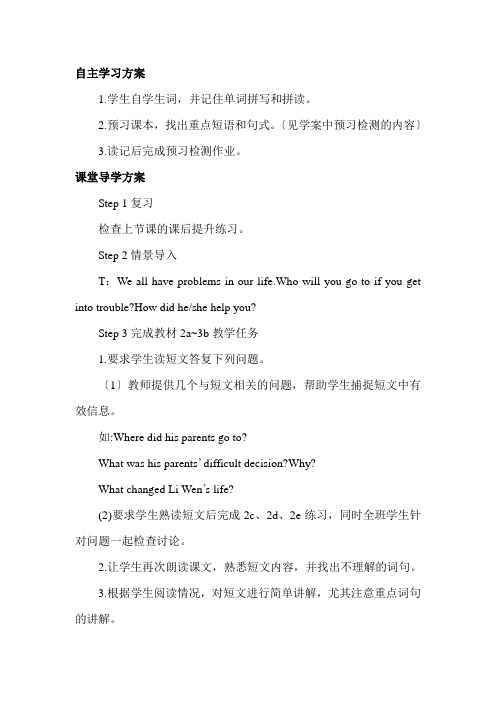【第1,2,3,4,5天全部讲义】词悬浮公开课(12)(4)
高三一轮复习人教版英语公开课课件(共24张)

The days are gone when physical strength was all you needed to make a living.
I didn’t know the reason why he came late.
5.确定关系词的步骤: (1)先找先行词,看先行词指的是什么。 (2)看从句中所缺少的的成分。
7.关系代词as在从句中作主语、宾语和表语。
ቤተ መጻሕፍቲ ባይዱ
(1)先行词被such和the same修饰,
缺少宾语
Such books as you bought are useful.
The school is just the same as it was 10 years ago.
缺少表语
注意: such...that...引导结果状语从句。Such…..as… 引导定语从句。 如:They are such lovely children _t_h_a_t___we love them much。 从句不缺少成分
非限定性定语从句(去掉从句, 主句的意义仍然完整)
More exercises:
少主语,指事,非限制性
1.Reading books,________takes the reader to other worlds,is a wonderful way to enjoy life. A.that B.what C.as D.Which
together last year?
when
(2)介词取决于和先行词或动词的固定搭配
Do you know the girl __w__it_h__w_h_o_m_____he was talking ?
【第1,2,3,4,5天全部讲义】词悬浮公开课(12)(4)

词悬浮英语词汇速记专列第1站51. -tract- 拖,拉,拽【词源】来自拉丁语trahere(=to draw),过去分词tractus,意为to draw,变形为treat。
词根tract的意思与tend 正好相反,在英语中,tract直接作为名词,意思为“一片土地”,“地带”。
本词根其他拓展形式:-trait- = -traught- = -trail- = -trac- = -train- = -track- = -treat-。
【引申】拖拽/引导/抽/拖/吸引/拖拉/引出【前缀】a??- con- ex- dis-【后缀】-ion -ive -ly -ed -ness -ary -al -ure -or -able -ingattract [ə'trækt] vt. 吸引;引起vi. 吸引;有吸引力【词频1877】【X7M2】attraction [ə'trækʃən] n. 吸引,吸引力;引力;吸引人的事物【词频3830】attractive [ə'træktɪv] adj. 吸引人的;有魅力的;引人注目的【词频2828】【B1M4】attractively [ə'træktivli] adv. 迷人地;有吸引力地;动人地【词频26563】attracted [ə'træktɪd] adj. 吸引兴趣的;被吸引的【词频30726】attractiveness [ə'træktɪvnɪs] n. 吸引力;迷惑力【词频14028】contract ['kɒntrækt] vi. 收缩;订约vt. 订约;使缩短n. 合同【词频1273,5039】【B1M5】【B5M2】【X9M6】contraction [kən'trækʃən] n. 收缩,紧缩;缩写式;害病【词频8854】contractionary [kən'trækʃənərɪ] adj. 紧缩的【词频59016】contractual [kən'træktʃʊəl] adj. 契约的,合同的【词频14867】ccontracted [kən'træktid] adj. 收缩的,缩小的;已定约的,已订婚的【词频24894】contracture [kən'træktʃə] n. (医)挛缩,痉挛【词频43805】extract [ˈekstrækt] vt. 提取;取出;摘录;榨取n. 摘录;榨出物;选粹【词频5020,7342】【X9M4】【X10M5】extraction [ik'strækʃən] n. 取出;抽出;拔出;抽出物;出身【词频10712】extractor [ik'stræktə] n. 抽出器,拔取的人,[计]抽取字;[化]浸取器;萃取器,[医]拔出器【词频33575】extractive [ɪk'stræktɪv] n. 提取物;抽出物;精华adj. 提取的;可萃取的;精萃的【词频27000】extracted [iks'træktid] adj. 萃取的;引出的【词频34866】extractable [ɪk'stræktəbl] adj. 可抽出的,可榨出的;可推断出的【词频58719】distract [dɪ'strækt] vt. 转移;分心【词频4539】【X10M5】distraction [dɪ'strækʃ(ə)n] n. 注意力分散;消遣;心烦意乱【词频6253】【B2M2】distracting [dɪ'stræktɪŋ] adj. 分心的;分散注意力的【词频23065】distracted [dis'træktid] adj. 心烦意乱的;思想不集中的【词频27947】distractedly [dis'træktidli] adv. 心烦意乱地【词频27086】distractive [dɪ'stræktɪv] adj. 分散注意力的;扰乱的【词频59588】41. -cept- 拿, 抓【词源】词根-cap-来源于拉丁语capere,可以追溯到原始印欧语根*kap-,表示“take,hold,seize(取,抓住)”。
如何讲好一节公开课--2024届高三英语一轮复习

如何讲好一节公开课公开课是一种面向非特定人群公开的课程讲授形式。
面向学生的公开课,除了学生参加听课外,一般还有领导及其他老师参加。
为什么要讲公开课?作为教研形式的公开课,是老师展示教学水平,交流教学经验的好时机,为教师的专业成长提供平台,可以帮助青年教师快速成长。
公开课包括课前,课中和课后三个环节。
下面我就具体环节逐个展开:课前准备环节:1.备课。
手边放到三至五本常用的备课资料。
资料不是越多越好,太多了东一榔头西一棒子,反而会影响效率。
最好是自己平时用顺手的,不建议公开课前临时增加其他新资料。
把握不好容易出问题。
如果是讲校内公开课,还有一个最好的智囊团,就是身边的同事,因为熟悉彼此学生的水平和层次,这些同事们的建议可操作性更强,更符合学情。
所以多向身边的人请教总没错。
2. 做课件。
有了思路以后就可以着手做课件。
课件要简洁大方,一个页面不超过三种颜色为宜,太多会喧宾夺主。
课件内容可以参考学科网、组卷网和教师参考书。
如果是下载的课件,一定要进行二次创作。
目标和重点难点的设置要与自己的学生水平相符合,内容上也应根据自己学生的基础和水平进行增删。
做好课件后反复梳理,发现问题立即修改。
在上课前一遍一遍熟悉,达到每个环节闭上眼睛能在脑海中匹配出对应课件的程度。
3. 做学案。
学案要和课件相匹配。
但不需要每个步骤都有,特别简单的内容课件上出现就行,需要动笔写的和需要思考的内容,在学案上呈现出来即可。
学案的排版设置紧凑一些,不要太松散。
一张A4纸正反两面就可以。
内容不宜太多,多数公开课都存在讲不完的情况。
所以务必控制内容量,保证任务当堂清。
课上操作环节:上课过程中细节最多,也最考验人,因为要跟课堂要效率,所以每一分钟都要提前做规划,把控好课堂节奏。
1.课堂目标的呈现。
教学目标一定要写在前面,可以PPT展示,但最好提前板书在黑板上。
并且要用一两分钟解读一下当堂目标。
要是当时忘记往黑板上写,但课件已展示过,后边就不要写了。
昂克英文君讲义

昂克英文君讲义Andy's English Class CurriculumUnit 1: Introduction to English- Greetings and introductions- Basic classroom phrases and expressions - Alphabet and pronunciation practice- Vocabulary building exercisesUnit 2: Grammar Basics- Parts of speech- Sentence structure and basic grammar rules - Subject-verb agreement- Present tense and present continuous tense Unit 3: Vocabulary Expansion- Common everyday vocabulary- Food, clothing, and daily objects- Family vocabulary- Descriptive words and adjectivesUnit 4: Numbers and Counting- Cardinal and ordinal numbers- Counting objects and people- Basic mathematical operations- Time and date expressionsUnit 5: Listening and Speaking Skills- Listening for comprehension- Responding to questions and requests- Giving directions and instructions- Conversational skills and role-playsUnit 6: Reading and Writing Skills- Reading comprehension exercises- Writing simple sentences and paragraphs- Describing events and experiences- Writing letters and emailsUnit 7: Cultural Knowledge- Learning about different cultures and customs- Holidays and celebrations around the world- Understanding cultural diversity- Language and communication in different cultures Unit 8: Intermediate Grammar- Past tense and past continuous tense- Future tense and future continuous tense- Conditional sentences- Reported speech and indirect questionsUnit 9: Practical Communication- Making appointments and reservations- Ordering food at a restaurant- Asking for and giving directions- Negotiating and problem-solving in EnglishUnit 10: Review and Assessment- Comprehensive review of all previously learned topics - Final assessment to evaluate students' progress- Feedback and suggestions for further improvement - Celebrating the completion of the course。
胡小平考研英语词汇突破班讲义

考研英语词汇专项讲义I. V ocabulary Usage Analysis:例11) Everybody loves a fat pay rise. Yet pleasure at your own can vanish if you learn that a colleague has been given a bigger one. Indeed, if he has a reputation for slacking, you might even be outraged. Such b ehaviour is regarded as “all too human”, with the underlying assumption that other animals would not be capable of this finely developed sense of grievance. But a study by Sarah Brosnan and Frans de Waal of Emory University in Atlanta, Georgia, which has just been published in Nature, suggests that it all too monkey, as well. [05]21. In the opening paragraph, the author introduces his topic by[A] posing a contrast.[B] justifying an assumption.[C] making a comparison.[D] explaining a phenomenon.2) 45 contrast, they saw in the preceding hundred years from 1650 to 1750, when England was still a 46 agricultural country, a period of great abundance and prosperity. [98]45. [A] On [B] With [C] For [D] By46. [A] broadly [B] thoroughly [C] generally [D] completely3) … This does not mean that adults must accept irresponsibility. 38, they can help studentsacquire a sense of commitment.[A] On the contrary [B] On the average[C] On the whole [D] On the other hand4) A lack of formal education, however, doesn’t constrain the ability of the developing world’s workforce to substantially improve productivity for the foreseeable future. On the contrary, constraints o n improving productivity explain why education isn’t developing more quickly there than it is. [09-T4]35. According to the last paragraph, development of education[A] results directly from competitive environments.[B] does not depend on economic performance.[C] follows improved productivity.[D] cannot afford political changes.例2In the first year or so of Web business, most of the action has revolved around efforts to tap the consumer market. More recently, as the Web proved to be more than a fashion, companies have started to buy and sell products and services with one another. Such business-to-business sales make sense because business people typically know what product they're looking for.55. W e learn from the beginning of the passage that Web business[A] has been striving to expand its market[B] intended to follow a fanciful fashion[C] tried but in vain to control the market[D] has been booming for one year or so例3But, for a small group of students, professional training might be the way to go since well-developed skills, all other factors being equal, can be the difference between having a job and not. Of course, the basics of using any computer these days are very simple. It does not take a lifelong acquaintance to pick up various software programs. If one wanted to become a computer engineer, that is, of course, an entirely different story. Basic computer skills take—at the very longest—a couple of months to learn. In any case, basic computer skills are only complementary to the host of real skills that are necessary to becoming any kind of professional. It should be observed, of course, that no school, vocational or not, is helped by a confusion over its purpose.62. According to the author, basic computer skills should be[A] included as an auxiliary course in school[B] highlighted in acquisition of professional qualifications[C] mastered through a life-long course[D] equally emphasized by any school, vocational or otherwise例4Since the dawn of human ingenuity, people have devised ever more cunning tools to cope with work that is dangerous, boring; burdensome, or just plain nasty. That compulsion has resulted in robotics the science of conferring various human capabilities on machines. And if scientists have yet to create the mechanical version of science fiction, they have begun to come close.As a result, the modern world is increasingly populated by intelligent gizmos whose presence we barely notice but whose universal existence has removed much human labor. Our factories hum to the rhythm of robot assembly arms. Our banking is done at automated teller terminals that thank us with mechanical politeness for the transaction. Our subway trains are controlled by tireless robot-drivers. And thanks to the continual miniaturization of electronics and micro-mechanics, there are already robot systems that can perform some kinds of brain and bone surgery with submillimeter accuracy—far greater precision than highly skilled physicians can achieve with their hands alone.46. Human ingenuity was initially demonstrated in[A] the use of machines to produce science fiction.[B] the wide use of machines in manufacturing industry.[C] the invention of tools for difficult and dangerous work.[D] the elite's cunning tackling of dangerous and boring work.例5In1950, the U.S. spent $12.7 billion on health care. In 2002, the cost will be $1,540 billion. Anyone can see this trend is unsustainable. Yet few seem willing to try to reverse it. Some scholars conclude that a government with finite resources should simply stop paying for medical care that sustains life beyond a certain age—say 83 or so. Former Colorado governor Richard Lamm has been quoted as saying that the old and inf irm “have a duty to die and get out of the way”, so that younger, healthier people can realize their potential.I would not go that far. Energetic people now routinely work through their 60s and beyond, and remain dazzlingly productive. At 78, Viacom chairman Sumner Redstone jokingly claims to be 53.Supreme Court Justice Sandra Day O'Connor is in her 70s, and former surgeon general C. Everett Koop chairs an Internet start-up in his 80s.These leaders are living proof that prevention works and that we can manage the health problems that come naturally with age. As a mere 68-year-old, I wish to age as productively as they have.58. The author's attitude to ward Richard Lamm's remark is one of[A] strong disapproval. [B] reserved consent.[C] slight contempt. [D] enthusiastic support.例6It was 3:45 in the morning when the vote was finally taken. After six months of arguing and final 16 hours of hot parliamentary debates, Australia's Northern Territory became the first legal authority in the world to allow doctors to take the lives of incurably ill patients who wish to die. The measure passed by the convincing vote of 15 to 10. Almost immediately word flashed on the Internet and was picked up, half a world away, by John Hofsess, executive director of the Right to Die Society of Canada. He sent it on via the group's on-line service, Death NET. Says Hofsess:“We posted bulletins all day long, because of course this isn't just something that happened in Australia. It's world history.”The full import may take a while to sink in. The NT Rights of the Terminally III law has left physicians and citizens alike trying to deal with its moral and practical implications. Some have breathed sighs of relief, others, including churches, right-to-life groups and the Australian Medical Association, bitterly attacked the bill and the haste of its passage. But the tide is unlikely to turn back. In Australia—where an aging population, life-extending technology and changing community attitudes have all played their part—other states are going to consider making a similar law to deal with euthanasia. In the US and Canada, where the right to die movement is gathering strength, observers are waiting for the dominoes to start falling.From the second paragraph we learn that[A] the objection to euthanasia is slow to come in other countries.[B] physicians and citizens share the same view on euthanasia.[C] changing technology is chiefly responsible for the hasty passage of the law.[D] it takes time to realize the significance of the law's passage.II. V ocabulary Exercises:1.1) At first, the ______ of color pictures over a long distance seemed impossible, but, with painstaking efforts and at great expense, it became a reality.[A] transaction [B] transmission [C] transformation [D] transition2) …inaccurate or indefinite words may make it difficult for the listener to understand the 8_which is being transmitted to him.[A] speech [B] sense [C] message [D] meaning3) The parcel you post must be well packed. Inadequate packing can mean delay, damage or loss[A] [B] [C]at your expenses.[D]2.1) Emma said in her letter that she would appreciate ______ (hear) from you soon.2) I appreciated ______ the opportunity to study abroad two years ago.[A] having been given [B] having given [C] to have been given [D] to have given3) As I’ll be away for at least a year, I’d appreciate _____ from you now and then telling me how everyone is getting along.[A] hearing [B] to hear [C] to be hearing [D] having heard ……….. 略胡小平浙江大学外国语言文化与国际交流学院(SIS)E-mail: shopin@版权所有严禁翻印。
12课逐字教案

12课逐字教案第一篇:12课逐字教案导课:作为万物的灵长,我们每个人都应该勇于实现自己的人生价值。
在欧洲的文艺复兴中,人的价值和创造性被重新得到认识。
那么今天,就让我们一起走进第12课。
第一组:古希腊、古罗马时期的作品:(出示《面包房夫妻像》、《掷铁饼者》)这幅画描绘的是现实生活中的一对夫妻。
这件雕塑作品,有同学知道它的名字吗?这项体育项目的名字知道吧?(投铁饼)。
作品的名称就是《掷铁饼者》,它取材于希腊现实生活中的一项体育竞技活动,展现当时人的精神面貌。
我们再来看看中世纪时期人们的精神面貌是什么样的?第二组:中世纪作品(出示《司教安东尼·奥索》中世纪人物无精打采,昏昏欲睡。
中世纪绘画的创作以宗教题材为主。
夏特尔大教堂雕塑第三组:文艺复兴时期作品(出示《草地上的圣母》,我们再来欣赏一下,这一时期的雕塑作品:米开朗琪罗的作品《摩西》。
欣赏完三个不同历史时期的作品之后,我们来比较一下?你认为哪一历史时期的作品,更能体现出人的生命活力,更贴近现实生活?生:第一组生:第三组师:有的同学认为古希腊、古罗马时期,有的同学认为文艺复兴时期。
也就是说这两个时期的作品在表现人所具有的特性、活力方面,有相似之处,更贴近生活。
而中世纪作品刻划的人神形象,表情呆板,无精打采,给人一种神秘的压抑感。
但我们看古罗马希腊和文艺复兴时期的这两组作品的创作时间相差了近千年。
给人的感觉是,光辉灿烂的古希腊、古罗马文化在经过中世纪天主教会的长期压制以后,又得到了再生,这称为文艺复兴。
但文艺复兴时期的作品只是对古希腊古罗马时期作品的简单地模仿和再现吗,它还想表达怎样更深层次的含义呢?为什么在这一时期要兴起文艺复兴运动呢?一、探源文艺复兴1.思想根源:基督天主教统治欧洲思想界千年之久师:我们要想知道在14-16c为什么会兴起文艺复兴,就要了解在它之前的中世纪是怎样的一个时期。
我们看一段材料(出示材料),告诉我中世纪是一个怎样的世纪?生:基督教会统治人民,压抑人性。
【第1-5天讲义】词悬浮英语词汇速记专列(124)

词悬浮英语词汇速记专列第1站偏旁部首,词根词缀,他山之石,可以攻玉,词源追溯,一脉相承un-否定self-自己se-分neg-否定【后缀】-or=-er形容词或者名词后缀-ion名词后缀-ive形容词或者名次后缀-ed形容词或过去式或者过去分词-al形容词或者名词后缀-ist形容词或者名词后缀-ic形容词或者名词-ism名词,表……主义-ity名词,表……抽象含义-ly副词后缀-ful形容词elect [ɪ'lekt] adj. 选出的;当选的;卓越的n. 被选的人;特殊阶层;上帝的选民vt. 选举;选择;推选vi. 作出选择;进行选举【词频2279,24212,26682】【X7M2】{e-向外+-lect-采集—向外采集—选择}election [i'lekʃən] n. 选举【词频801】{elec选举+ion名词后缀}elector [i'lektə] n. 选举者,有选举权的人【词频21318】{ -elect-选举+-or=er形容词或者名词后缀}electoral [ɪ'lekt(ə)r(ə)l] adj. 选举的;选举人的{ -elector-选举人+-al形容词后缀}elective [ɪ'lektɪv] adj. 选修的;选举的;选任的n. 选修课程【词频12253,29152】{ -elect-选举+-ive形容词后缀}collect [kə'lekt] vt. 收集;募捐vi. 收集;聚集;募捐adv. 由收件人付款地adj. 由收件人付款的【词频1322,32894】{col-在一起+ -lect-选举}collection [kə'lekʃ(ə)n] n. 采集,聚集;[税收] 征收;收藏品;募捐【词频1046】【X6M4】{ collect收集,募捐+ion名词后缀}collected [kə'lektɪd] adj. 镇定的;收集成的【词频14593】{ collect收集,募捐+ed形容词/过去式/过去分词后缀}collector [kə'lektə] n. 收藏家;[电子] 集电极;收税员;征收者【词频4006】{ collect收集,募捐+or名词/形容词后缀,表人/物}collective [kə'lektiv] adj. 集体的;共同的;集合的;集体主义的n. 集团;集合体;集合名词【词频3364,10767】{ collect收集,募捐+ive形容词/名词后缀}collectivity [,kɒlek'tɪvɪtɪ] n. 集体;集体主义【词频27830】{ collect ive集体的+ity名词,表……抽象}collectively [kə'lektivli] adv. 共同地,全体地【词频7664】{ collect ive集体的+ly副词后缀}collectivism [kə'lektivizəm] n. 集体主义【词频29064】{ collect ive集体的+ism名词,表……主义collectivist [kə'lɛktɪvɪst] n. 集体主义者adj. 集体主义的【词频25298】{ collect ive集体的+ist名词/形容词,表人/物}collectivistic [kə,lekti'vistik] adj. 集体主义的【词频44558】{ collect ive集体的+ic形容词/名词select [sɪ'lekt] vt. 挑选;选拔adj. 精选的;挑选出来的;极好的vi. 挑选n. 被挑选者;精萃【词频1742,5716】【X8M4】se-分+-lect-采集—分采集—挑选selector [sɪ'lektə] n. 选择器;挑选者【词频29834】select选择+or名词/形容词后缀[sɪ'lektɪd] adj. 挑选出来的【词频4979】unselected [ʌnsi'lektid] adj. 未经选择的【词频48987】un否定+select选择+ed形容词/过去式/过去分词后缀selection [si'lekʃən] n. 选择,选择物,选集,选品【词频2146】select选择+ion名词后缀self-selection [,selfsi'lekʃən] n. 自己挑选【词频37058,41630】slef-自己+select选择+ion名词selective [sɪ'lektɪv] adj. 选择性的;讲究的【词频6277】select选择+-ive形容词/名词后缀selectivity [sɪlek'tɪvɪtɪ] n. 选择性;选择度【词频22193】selective选择的+-ity名词,表抽象selectively [sə'lɛktɪvli] adv. 有选择地【词频13059】selective选择的+-ly副词neglect [nɪ'glekt] vt. 疏忽,忽视;忽略n. 疏忽,忽视;怠慢【词频5115,6910】【X10M1】neg-否定+lect采集——不采集——就是忽视、怠慢neglectful [ni'ɡlektful] adj. 疏忽的;忽略的;不小心的【词频26640】neglect-忽视+-ful形容词neglected [nɪˈglektɪd] adj. 被忽视的【词频11409】neglect-忽视+-ed形容词/过去式/过去分词,表被动10. -press- 压,按【词源】来自拉丁语pressare,按,压,来自premere,按,压,-ss,过去分词格或表反复,来自PIE*per,击,打,捶,词源同print.由按,压引申词义印刷,报纸等相关词义。
(新)人教新目标版九上 Unit 4 第课时4(公开课)教案

自主学习方案1.学生自学生词,并记住单词拼写和拼读。
2.预习课本,找出重点短语和句式。
〔见学案中预习检测的内容〕3.读记后完成预习检测作业。
课堂导学方案Step 1复习检查上节课的课后提升练习。
Step 2情景导入T:We all have problems in our life.Who will you go to if you get into trouble?How did he/she help you?Step 3完成教材2a~3b教学任务1.要求学生读短文答复下列问题。
〔1〕教师提供几个与短文相关的问题,帮助学生捕捉短文中有效信息。
如:Where did his parents go to?What was his parents’ difficult decision?Why?What changed Li Wen’s life?(2)要求学生熟读短文后完成2c、2d、2e练习,同时全班学生针对问题一起检查讨论。
2.让学生再次朗读课文,熟悉短文内容,并找出不理解的词句。
3.根据学生阅读情况,对短文进行简单讲解,尤其注意重点词句的讲解。
4.编对话〔李文和父母之间的会话〕。
环节说明:带着问题去读会有助于学生从短文中提取有效信息,更能培养学生的阅读能力。
Step 4小结训练1.Because he is poor,he doesn’t (自信)。
2.You should(注意)your teacher in class.3.You are(不再)a child.you can (做决定)where to go.4.(即使)he isn’t with you ,he(为……感到骄傲)you.答案:1.feel good about himself2.pay attention to3.no longer,make a decision4.Even though,takes pride inStep 5Writing1.做笔记〔有关你的外貌,个性和爱好等方面的变化是怎样的〕并和伙伴一起讨论。
- 1、下载文档前请自行甄别文档内容的完整性,平台不提供额外的编辑、内容补充、找答案等附加服务。
- 2、"仅部分预览"的文档,不可在线预览部分如存在完整性等问题,可反馈申请退款(可完整预览的文档不适用该条件!)。
- 3、如文档侵犯您的权益,请联系客服反馈,我们会尽快为您处理(人工客服工作时间:9:00-18:30)。
词悬浮英语词汇速记专列第1站51. -tract- 拖,拉,拽【词源】来自拉丁语trahere(=to draw),过去分词tractus,意为to draw,变形为treat。
词根tract 的意思与tend正好相反,在英语中,tract直接作为名词,意思为“一片土地”,“地带”。
本词根其他拓展形式:-trait- = -traught- = -trail- = -trac- = -train- = -track- = -treat-。
【引申】拖拽/引导/抽/拖/吸引/拖拉/引出【前缀】a??- con- ex- dis-【后缀】-ion -ive -ly -ed -ness -ary -al -ure -or -able -ingattract [ə'trækt] vt. 吸引;引起 vi. 吸引;有吸引力【词频1877】【X7M2】attraction [ə'trækʃən] n. 吸引,吸引力;引力;吸引人的事物【词频3830】attractive [ə'træktɪv] adj. 吸引人的;有魅力的;引人注目的【词频2828】【B1M4】attractively [ə'træktivli] adv. 迷人地;有吸引力地;动人地【词频26563】attracted [ə'træktɪd] adj. 吸引兴趣的;被吸引的【词频30726】attractiveness [ə'træktɪvnɪs] n. 吸引力;迷惑力【词频14028】contract ['kɒntrækt] vi. 收缩;订约 vt. 订约;使缩短 n. 合同【词频1273,5039】【B1M5】【B5M2】【X9M6】contraction [kən'trækʃən] n. 收缩,紧缩;缩写式;害病【词频8854】contractionary [kən'trækʃənərɪ] adj. 紧缩的【词频59016】contractual [kən'træktʃʊəl] adj. 契约的,合同的【词频14867】ccontracted [kən'træktid] adj. 收缩的,缩小的;已定约的,已订婚的【词频24894】contracture [kən'træktʃə] n. (医)挛缩,痉挛【词频43805】extract [ˈekstrækt] vt. 提取;取出;摘录;榨取 n. 摘录;榨出物;选粹【词频5020,7342】【X9M4】【X10M5】extraction [ik'strækʃən] n. 取出;抽出;拔出;抽出物;出身【词频10712】extractor [ik'stræktə] n. 抽出器,拔取的人,[计]抽取字;[化]浸取器;萃取器,[医]拔出器【词频33575】extractive [ɪk'stræktɪv] n. 提取物;抽出物;精华 adj. 提取的;可萃取的;精萃的【词频27000】extracted [iks'træktid] adj. 萃取的;引出的【词频34866】extractable [ɪk'stræktəbl] adj. 可抽出的,可榨出的;可推断出的【词频58719】distract [dɪ'strækt] vt. 转移;分心【词频4539】【X10M5】distraction [dɪ'strækʃ(ə)n] n. 注意力分散;消遣;心烦意乱【词频6253】【B2M2】distracting [dɪ'stræktɪŋ] adj. 分心的;分散注意力的【词频23065】distracted [dis'træktid] adj. 心烦意乱的;思想不集中的【词频27947】distractedly [dis'træktidli] adv. 心烦意乱地【词频27086】distractive [dɪ'stræktɪv] adj. 分散注意力的;扰乱的【词频59588】41. -cept- 拿, 抓【词源】词根-cap-来源于拉丁语capere,可以追溯到原始印欧语根*kap-,表示“take,hold,seize(取,抓住)”。
我们熟知的单词have同出此源,h-c互换,p-v互换,其构词智慧可理解为“只有抓住了,才能称得上是拥有”。
单词capable由cap加上形容词后缀-able构成,表示“能够取得的,能够抓住的”,所以表示“有能力的,能干的”。
根据元音弱化规律,-cap-衍生出了-ceive-这个词根。
为了衔接后面的成分,-cap-加上字母t,演变成了-capt-/-cept-。
capture(捕获)和captivate(迷惑)同源,所谓“迷惑”,也就是你的心被他或她“捉住”。
单词concept表示‘概念、观念’,(大家熟知的《新概念英语》就是New Concept English)前缀con-表示全部,cept 是抓,这里引申为接受,概念就是大家都接受的东西。
名词conception还有怀孕的含义,把精子和卵子“抓”到一起来,不就怀孕了吗?电影Inception(《盗梦空间》)这个单词体现出来的核心概念就是“进到别人的梦境里去获取(拿)大脑里面的信息”,再深层次就是“进入梦境里面植入构想”前缀in-表示“里面”,-cept-表示“拿”,-tion是名词后缀。
单词incetion还有“开始”的含义,就是“拿在手里,开始着手做”的意思。
其次,还来源于拉丁语capere/capax拿/容纳,它的同源异形词根有四个:-capt-/-cept-/-ceive-/-cip-,它们的拼法之所以不同是由于历史原因造成的。
像-ceiv-的拼法是由拉丁语到法语,再由法语到英语的。
所以,当你看到由-ceiv-构成的词汇时,可以试试它与-cap-的联系。
如:captive俘虏、capture捕获/战利品、deception 阴谋/诡计、deceptive虚伪的/欺骗的、conceive想象/设想、perceive了解/觉察、incipient 初期的/刚开始的、incipience初期/早期;来源于词根-cap-头/首的变体,含义为它的引申义。
【引申】取/拿/抓住/握住/容纳/接收【前缀】a??- ex- con- re-【后缀】-ed -or -ance -able -ly -ity -ion -ive -al-ize -ation -istaccept [ək'sept] vi. 承认;同意;承兑 vt. 接受;承认;承担;承兑【词频766】accepted [ək'septɪd] adj. 公认的;录取的;可接受的;已承兑的【词频6825】acceptor [ək'septə] n. [金融] 承兑人;接受者;接收器;受主;被诱物【词频45306】acceptance [ək'septəns] n. 接受,接纳;[金融]承兑;无怨接受(逆境、困境等);赞成【词频3466】acceptable [ək'septəbl] adj. 可接受的;合意的;(社会上)认同的;(礼物等)令人满意的【词频3438】acceptably [ək'sɛptəbli] adv. 可欣然接受地;合意地【词频34820】acceptability [ək,sɛptə'bɪləti] n. 可接受性;可容许性【词频15800】except [ik'sept] vt. 把…除外;不计 prep. 除…外 conj. [口语]要不是;除非;除…以外vi. 反对,表示异议(与 to 或 against连用)【词频1846,1903,19332】exception [ɪk'sepʃ(ə)n] n. 例外,除外; 反对,批评; [法律]异议,反对【词频2417】【B5M3】exceptive [ik'septiv] adj. 作为例外的,特殊的exceptional [ɪk'sepʃ(ə)n(ə)l] adj. 特别的,非凡的,卓越的,异常的,特殊的 n. 超常的学生【词频6081】【X6M5】exceptionally [ɪk'sepʃ(ə)nəlɪ] adv. 异常地;特殊地;例外地【词频8867】exceptionality [ɪk,sepʃə'nælətɪ] n. 例外;除外【词频38727】concept ['kɒnsept] n. 概念;观念【词频1159】【X7M2】【X8M4】conception [kən'sepʃ(ə)n] n. 怀孕;概念;设想;开始【词频4680】conceptual [kən'septjʊəl] adj. 观念的,概念上的【词频5585】conceptually [kən'sɛptʃʊəli] adv. 概念地【词频15384】conceptualize [kən'septjʊəlaɪz] vt. 使概念化 vi. 概念化【词频11285】conceptualization [kən,sɛptjʊəlɪ'zeʃən] n. 概念化;化为概念【词频13096】recept ['riːsept] n. 感觉,感受;对相似物体之连续感觉而形成感觉reception [rɪ'sepʃ(ə)n] n. 欢迎会;招待会【词频3975】【X6M1】receptionist [rɪ'sepʃ(ə)nɪst] n. 接待员;传达员【词频10527】receptor [rɪ'septə] n. [生]感受器,受体;[电]感受器,接收器;[化]接受器;感觉器官【词频9976】receptive [rɪ'septɪv] adj. 善于接受的;能容纳的;有接受力的;感受的,感官的【词频9982】receptivity [rɪ,sɛp'tɪvəti] n. 接受能力;[生理] 感受性【词频23892】21. -lect- 采集【词源】①都来源于拉丁语legere选/挑,前者是此词的动名词词干,中间是此词的不定式词干,后者是-leg-在添加某些前缀时的音变形式;其中,前者的派生词最多。
